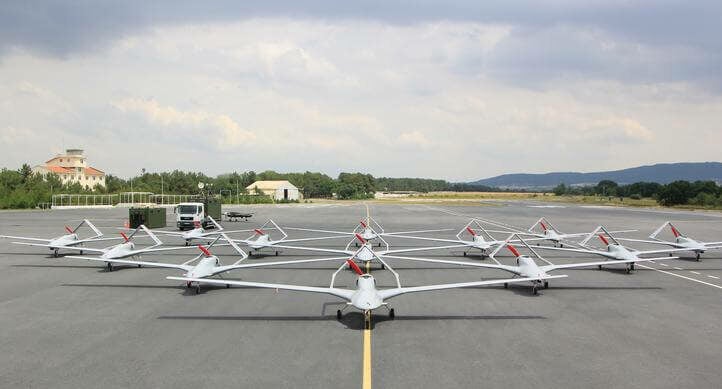Turkish defense contractor Baykar, whose chairman Selçuk Bayraktar is the son-in-law of Turkish President Recep Tayyip Erdoğan, increased its arms revenue by 94 percent in 2022, according to a report from the Stockholm International Peace Research Institute (SIPRI).
Baykar was one of four Turkish companies listed among the 100 largest arms companies in the world, according to the report. It was ranked 76th and had arms revenue of $1.42 billion in 2022. Its increase in revenue was the largest among all top 100 companies, “as a result of growing sales of Bayraktar TB-2 UAVs, which have been used extensively by Ukraine during the war,” the report said.
According to SIPRI, companies that produced weapons needed in large volumes in the context of a war of attrition, such as in Ukraine, and that could respond quickly to rising demand tended to see an increase in arms revenue in 2022, an example being Baykar.
“Companies that manufactured less advanced types of military equipment—for which production could be scaled up more easily—probably benefited the most. For example, Baykar, which is based in Türkiye and produces UAVs using mostly off-the-shelf components, increased its arms revenue by 94 per cent,” said SIPRI.
Baykar, which ranked at the bottom of the SIPRI list in 2021, had $730 million in revenue in 2021.
Baykar gained significant recognition for the effectiveness of its drones in countering Russian forces in Ukraine, particularly in the initial weeks of the Russian invasion, where they successfully countered Russian armor and anti-aircraft systems. In addition to importing drones from Turkey, Kyiv announced in July that the construction of a Turkish Bayraktar drone manufacturing plant had begun in Ukraine.
Drones developed by Baykar have been exported to at least 30 countries and have been used in conflicts in Azerbaijan and Libya in addition to Ukraine. Many say the company owes its success to Erdoğan, who personally promotes Baykar drones during his visits to foreign countries, as a result of which agreements worth of millions of dollars are signed.
In July Baykar signed an export and cooperation agreement with Saudi Arabia’s Ministry of Defense for the unmanned combat aerial vehicle (UCAV) Bayraktar Akıncı. The deal was recorded as the largest defense and aerospace export contract in the history of Turkey. The agreement was made during a visit by Erdoğan to Saudi Arabia. No details were given about the value of the deal, but there were reports that it was worth of $3.1 billion.
Haluk Bayraktar, CEO of Baykar, in a tweet called the deal “the biggest defense and aviation export contract in the history of the Turkish Republic.”
Turkey’s largest defense electronics company ASELSAN ranked 60th on the SIPRI list, Turkish Aerospace Industries (TUSAŞ) was ranked 82nd, while Roketsan, which appeared on the list for the first time, ranked at the bottom.
The arms revenue of the four Turkish companies on the list was $5.5 billion, 22 percent more than in 2021.
President Erdoğan said earlier this year that Turkey is aiming for $6 billion in defense industry exports this year, but the sales could well surpass that mark to reach $7.5 billion, according to representatives and observers of Turkey’s defense industry sector.
The SIPRI report also showed the arms revenue of the top 100 arms-producing and military services companies totaled $597 billion in 2022, a decrease of 3.5 percent in real terms compared to 2021.
It said Russia’s invasion of Ukraine drove increased demand for weapons in 2022. However, many arms companies’ efforts to increase production capacity were hindered by labor shortages, rising costs and supply chain disruptions.
“Outstanding orders and a wave of new contracts signal that global arms revenue could grow substantially in the next few years,” said the report.
The SIPRI Arms Industry Database was created in 1989. At that time, it excluded data for companies in China, the Soviet Union and countries in Eastern Europe. The data set has been updated over the years. The current version includes data for Russian companies from 2002 onwards and for some Chinese companies from 2015 onwards.



